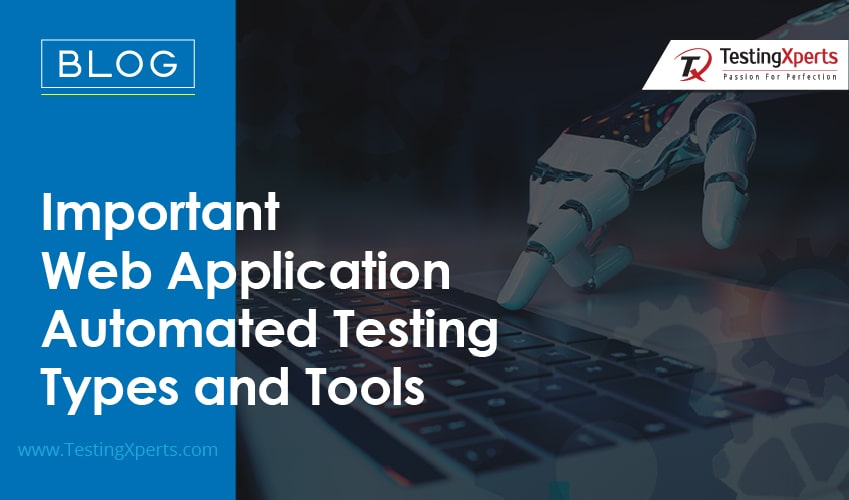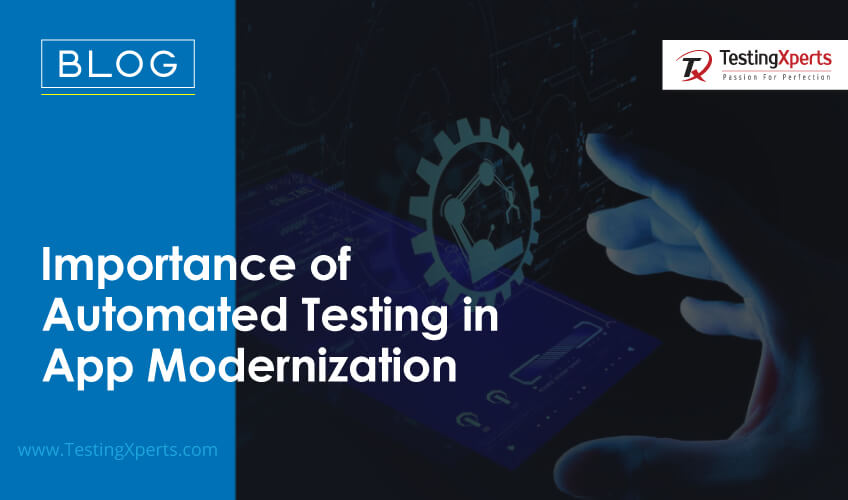
Table of Contents
- What is App Modernization?
- Types of App Modernization
- Role of Automated Testing in App Modernization
- Automation Testing Tools & Frameworks for App Modernization
- How to Choose the Right Automated Testing Tool?
- Conclusion
- How Can TestingXperts Help with Automated Testing for App Modernization?
What is App Modernization?
App Modernization refers to updating older software applications with modern architectures, features, and capabilities, ensuring they remain relevant and efficient in contemporary IT environments. It encompasses many activities, from simple code refactoring to replacing legacy systems entirely.
The digital landscape is evolving at a remarkable rate. With over 87% of enterprises reporting digital disruptions challenging their business models, there’s a pressing need to adapt and transform. Here’s why modernization is so essential:
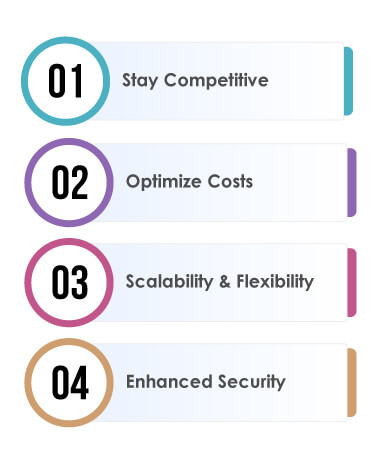
Stay Competitive:
Modern applications cater to current market expectations, ensuring businesses remain relevant in the eyes of customers and stakeholders. According to a study, companies that fail to modernize risk falling 20% behind their competitors in revenue and customer satisfaction.
Optimize Costs:
Legacy systems, although familiar, can be expensive to maintain. Upkeeping outdated software drains resources, while modern apps can reduce operational costs by up to 25%, enhancing ROI.
Scalability & Flexibility:
Modern applications are designed to scale with growing business demands. They offer flexibility, ensuring businesses can quickly pivot in response to changing market dynamics.
Enhanced Security:
As cyber threats become increasingly sophisticated, outdated software becomes more vulnerable. Modernized apps incorporate the latest security measures, protecting valuable business data from breaches.
Types of App Modernization

App modernization is a comprehensive process that involves updating and improving software applications to enhance performance, security, and adaptability in today’s technological landscape. As technologies evolve, businesses need various methods to update their software based on specific needs and objectives. Let’s explore the different modernization techniques to determine which might be optimal for varying scenarios:
Re-hosting & Re-platforming:
Re-hosting is about taking an app from one environment and moving it to another, like from an in-house server to the cloud. It doesn’t change how the app looks or works but where it’s located. Re-platforming means making changes for apps to perform better in their new environment without altering their core functions.
Refactoring & Re-architecting:
Refactoring is making small changes in the software to improve its performance or clarity without changing what it does. Re-architecting means restructuring the app, changing how it works internally to make it more efficient or to add new features.
Rebuilding & Replacing:
Rebuilding means making the app again from scratch using modern methods and technologies. Replacing means buying or adopting a new app to replace the outdated one.
Every business is different, and there’s no one-size-fits-all answer. When deciding on a modernization approach, companies should consider their goals, budget, and how crucial the app is to their operations. For some, a simple re-host might be enough. Others might benefit from a complete rebuild. It is essential to evaluate the needs, consult with IT experts, and choose a path that aligns with the business’s future vision.
Automated Testing: A Deeper Dive
In the context of app modernization, the efficacy of the updated software is paramount. Automated Testing, an integral aspect of modern software development, employs specialized tools and software for comprehensive testing procedures. This approach not only assures the quality of the software but also streamlines the deployment process.
Why Manual Testing Isn’t Enough in Modernization?
While manual testing offers the advantage of human intuition, its scalability and efficiency in the face of complex modernized applications are limited. Applications today can encompass extensive lines of code, making exhaustive manual testing cumbersome and less precise. Automated Testing provides a systematic and swift alternative, enabling thorough verification of modernized applications to ensure optimal performance.
Continuous Integration and Continuous Deployment in Modernization
CI/CD displays modern software development characteristics. CI represents the frequent integration and testing of code changes, while CD ensures that these validated changes are promptly deployed. Automated Testing is foundational to this framework, facilitating rapid and reliable assessments and enabling businesses to deploy updates with greater frequency and confidence.
Role of Automated Testing in App Modernization

Ensuring the new version works perfectly when updating old software is crucial. That’s where Automated Testing comes in. It checks every part of the software to ensure it’s functioning correctly and is secure. Let’s explore how Automated Testing helps when modernizing apps:
Ensuring Seamless Transition:
When businesses update their software, they must test it to ensure a smooth transition. Automated Testing does this quickly and thoroughly. It checks the new software, finds problems, and ensures that the transition from old to new is smooth, with no major errors.
Reducing Errors and Reworks:
Mistakes can be expensive. If a business launches updated software with issues, fixing them later can cost time and money. Automated testing detects these issues early on. By catching problems before they reach users, businesses can save money on fixing issues and avoid the costs of unhappy customers.
Improving Time-to-Market:
In the business world, time is money. Getting updated software to customers faster can be a significant advantage. Automated Testing speeds things up. Instead of waiting for humans to check everything manually, a computer program quickly tests the software. This means businesses can launch their modernized apps faster and stay ahead of the competition.
Building Trust in Modernized Apps:
People trust brands that offer quality. When businesses update their software, they want users to trust the new version. Automated Testing helps with this. Thoroughly checking the software ensures that the updated app is of high quality. So, when users use it, they can be confident that it will work well.
Automation Testing Tools & Frameworks for App Modernization
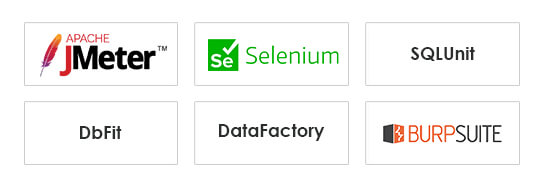
As app modernization becomes necessary, the right automated testing tools and frameworks become essential to ensure the revamped software meets quality standards. These tools simplify the testing process and seamlessly integrate with modern development practices, making them a vital aspect of the modernization process. Here’s a list of some of the automated testing tools:
Selenium:
Selenium, an open-source tool, has gained popularity among testers for its flexibility and wide range of capabilities. It allows testing of web applications across various browsers, ensuring that the modernized application performs uniformly across platforms. The tool’s versatility, backed by a supportive community and rich documentation, makes it an ideal choice for many businesses venturing into app modernization.
Appium:
With the surge in mobile app usage, testing mobile apps for functionality and user experience is crucial. Appium is an open-source platform that enables automated testing on iOS and Android platforms, regardless of the native, mobile-web, or hybrid application type. Its ability to write tests in multiple programming languages further underscores its adaptability and broad reach.
TestNG & JUnit:
Frameworks like TestNG and JUnit have reshaped how developers approach testing in the Java environment. TestNG, inspired by JUnit, offers enhanced functionalities like grouping, sequencing, and parallelizing tests, ensuring a structured and comprehensive testing process. On the other hand, JUnit is known for its simplicity and annotations-driven approach, making it a staple in many modernized application testing scenarios.
Jenkins:
It’s an open-source tool that facilitates the automation of various stages in the development pipeline, including testing. Integrating seamlessly with various testing tools, Jenkins accelerates the feedback loop, allowing developers to address real-time issues essential for apps undergoing modernization.
How to Choose the Right Automated Testing Tool?
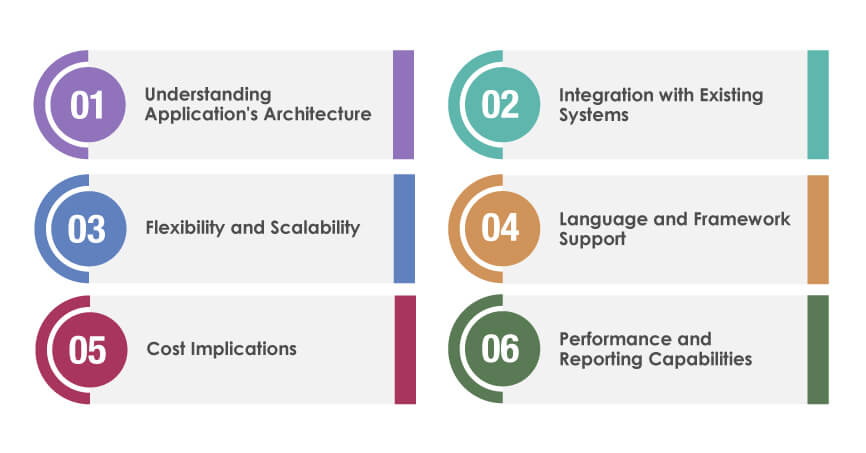
The key to making an informed choice lies in aligning the tool’s capabilities with the project’s specific requirements. This section provides a roadmap for businesses to determine which tool best aligns with their app modernization objectives.
Understanding Application’s Architecture:
Before starting with tool selection, it’s crucial to understand the application’s architecture undergoing modernizing. Is it a web application, a mobile app, or a desktop application? Different tools are optimized for different platforms. For instance, while Selenium excels in web application testing, Appium is tailored for mobile environments.
Integration with Existing Systems:
Consider how well the testing tool integrates with existing systems. A tool seamlessly integrating with your current development environment, version control system, and CI/CD pipeline can streamline the testing process, reduce manual interventions, and increase efficiency.
Flexibility and Scalability:
Modernized applications often evolve, adding new features and functionalities. The chosen testing tool should be flexible and scalable to accommodate this growth. It should allow testers to quickly modify, expand, or reduce tests’ scope without substantial rework.
Language and Framework Support:
The programming languages and frameworks the team is familiar with should be considered significantly. If the team is well-versed in Java, tools that support Java will have a shorter learning curve. Similarly, if an app is built on a specific framework, ensuring the tool that supports that framework can be beneficial.
Cost Implications:
While open-source tools come without licensing fees, it’s essential to consider the total cost of ownership. It includes training, maintenance, integration, and potential downtime costs. Sometimes, investing in a paid tool with premium support and features can be more cost-effective in the long run.
Performance and Reporting Capabilities:
Real-time feedback and comprehensive reports are vital to understanding the efficacy of tests. A tool that provides detailed logs, visual reports, and real-time alerts can help teams quickly identify issues and improve the quality of the modernized app.
Conclusion
The digital realm constantly evolves, with innovations and technologies reshaping how businesses operate and deliver value. In this dynamic environment, app modernization has become necessary for any organization to stay relevant and competitive. With its efficiency and precision, automated testing is essential for businesses. Businesses can confidently leverage new opportunities and tackle emerging challenges by ensuring modernized apps function optimally and meet quality standards.
How Can TestingXperts Help with Automated Testing for App Modernization?

In the evolving digital landscape, app modernization helps businesses to progress, offering them a way to remain agile, relevant, and ahead of the competition. Automated testing ensures that revamped applications meet and exceed quality benchmarks. At TestingXperts, we deliver top-notch automated testing solutions tailored for app modernization, ensuring your software is robust, efficient, and future-ready. Here’s why you should partner with TestingXperts for app modernization services:
• We utilize cutting-edge tools and methodologies for accurate testing
• Comprehensive testing expertise across web, mobile, and desktop platforms
• Seamless integration with continuous integration and continuous deployment pipelines
• Tailored solutions aligning with specific app modernization objectives
• Proactive monitoring and real-time feedback for early issue identification
• Commitment to continuous learning, ensuring alignment with the latest trends and best practices
• To know more, contact our QA experts now.
Discover more
Get in Touch
Stay Updated
Subscribe for more info




